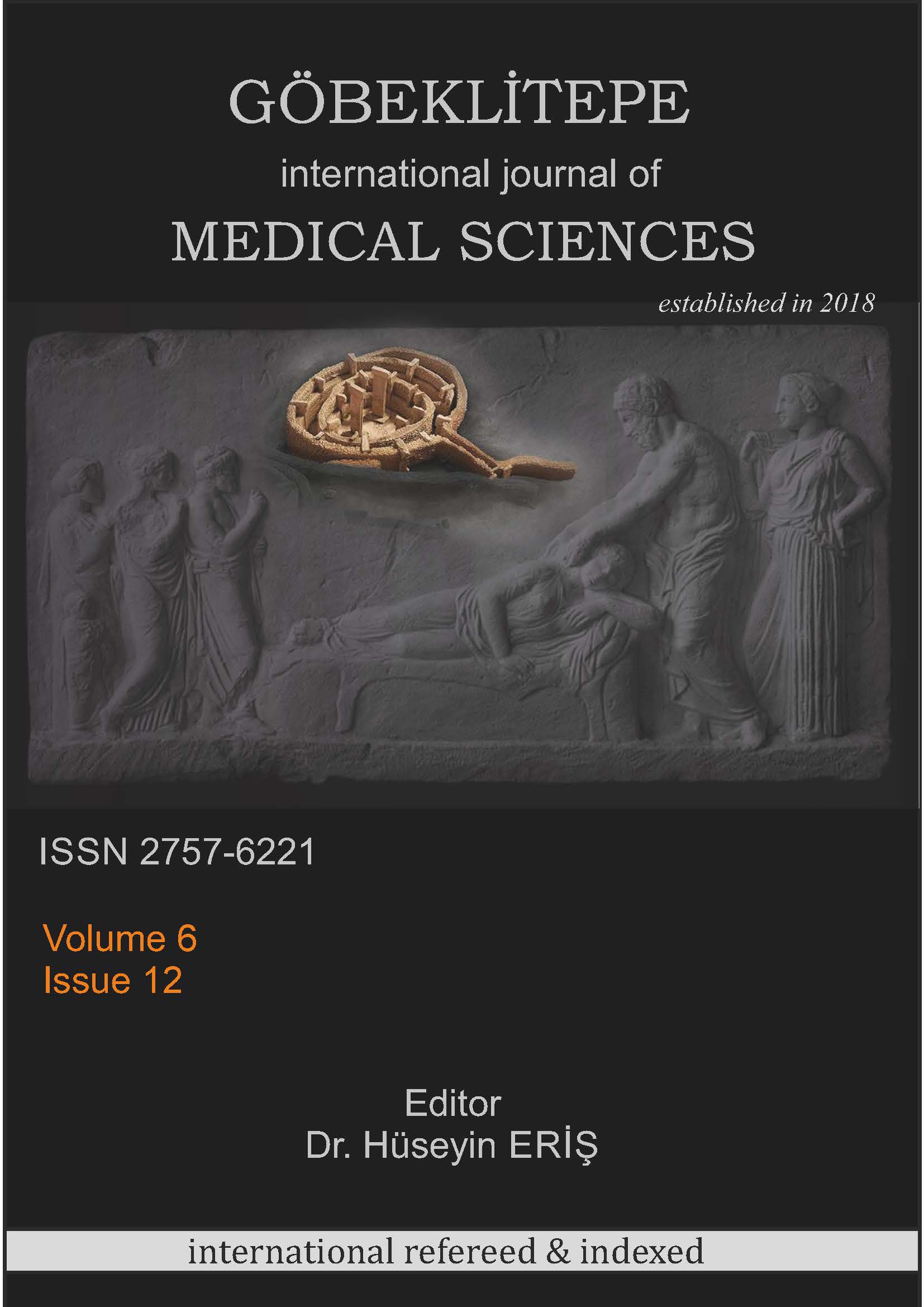THE RELATIONSHIP BETWEEN PREGNANCY STRESS AND SLEEP QUALITY WITH TRIMESTER
Pregnancy Stress and Sleep Quality
DOI:
https://doi.org/10.55433/gsbd/149Keywords:
pregnancy, trimester, pregnancy stress, sleep qualityAbstract
planned as a descriptive cross-sectional type, was carried out with 148 pregnant women. Data were collected using a personal information form, PSAS-36 and PSQI. Descriptive statistics, One Way ANOVA, Kruskal Wallis, Mann Whitney U, Independent Two Sample Test and were used in the analysis of the data. The total of 33.1% of the pregnant women were in the first trimester, 33.1% were in the 2nd trimester and 33.8% were in the 3rd trimester. There was no statistically significant difference between the mean PSAS-36 total scores of the pregnant women according to the trimester (p < 0.05). However, it was observed that there was a statistically significant difference between the mean PSQI scores of pregnant women according to trimester (p < 0.001). Poor sleep quality rates were 44.9% in the 1st trimester, 38.8% in the 2nd trimester & 64% in the 3rd trimester. A positive and significant correlation was found between the PSAS-36 and the total PSQI score (r: 0.246; p < 0.05). Increased total pregnancy stress score and being in the 3rd trimester of pregnancy is significantly increases the total score of PSQI (p: 0.001, p: 0.005). It was determined that the stress level of pregnant women was high in all three trimesters, and the worst sleep quality was experienced in the third trimester. Sleep quality decreases as the level of pregnancy stress increases and in the third trimester of pregnancy. It is recommended that midwives and nurses evaluate stress and sleep quality during pregnancy with objective tests and take interventions to reduce the stress level of pregnant women and increase sleep quality.
References
Margirit, A.C., Arslan, S., Okcu, G.(2020). Gebe kadınlarda gebelik algısının stres, demografik ve obstetrik özellikler açısından incelenmesi. HEAD. 17(1):1-8.
Koyucu, R.G., Ülkar, D., Erdem, B. (2020). Primipar ve multipar gebelerin gebelik streslerinin karşılaştırılması. İnönü Üniversitesi Sağlık Hizmetleri Meslek Yüksek Oku-lu Dergisi. 8(3):652-663.
Kaboli, K.S., Mahmoodi, Z., Tourzani, Z.M., Tehranizadeh, M., Kabir, K., Dolatian, M. (2017). The effect of group counseling based on cognitive-behavioral approach on pregnancy-specific stress and anxiety. Shiraz E-Med J. 18(5).
Esfandiari, M., Faramarzi, M., Nasiri-Amiri, F., Parsian, H., Chehrazi, M., Pasha, H., et al. (2020). Effect of supportive counseling on pregnancy-specific stress, general stress, and prenatal health behaviors: a multicenter randomized controlled trial. Patient Educ Couns. 103(11):2297-2304.
Faramarzi, M., Amiri, F.N., Rezaee, R. (2016). Relationship of coping ways and anxie-ty with pregnancy specific-stress. Pak J Med Sci. 32(6):1364-1369.
Mahaffey, B.L., Tilley, J.L., Molina, L.K., Gonzalez, A., Park, E., Lobel, M. (2022). "How am I going to make it through pregnancy?" a qualitative examination of prenatal maternal stress. Birth. 49(2):253-260.
Bakır, N., Demir, C., Şener, N. (2021). Gebelerin yaşadığı stres ve gebelik semptomları arasındaki ilişki. Karya J Health Sci. 2(3): 71-76.
Sis Çelik, A., Atasever, İ. (2021). Gebelerde algılanan stres düzeylerinin ve etkileyen faktörlerin belirlenmesi. Anadolu Hemşirelik ve Sağlık Bilimleri Dergisi. 23(2): 267-276.
Armans, M., Addante, S., Ciciolla, L., Anderson, M., Shreffler, K.M. (2020). Resili-ence during pregnancy: how early life experiences are associated with pregnancy-specific stress. ADV RES SCI. 1:295–305.
Lilliecreutz, C., Larén, J., Sydsjö, G., Josefsson, A. (2016). Effect of maternal stress during pregnancy on the risk for preterm birth. BMC Pregnancy Childbirth. 16:1-8.
Staneva, A., Bogossian, F., Pritchard, M., Wittkowski, A. (2015). The effects of ma-ternal depression, anxiety, and perceived stress during pregnancy on preterm birth: a systematic review. Women Birth. 28(3):179-193.
Li, G., Kong, L., Zhou, H., Kang, X., Fang, Y., Li, P. (2016). Relationship between prenatal maternal stress and sleep quality in Chinese pregnant women: the mediation effect of resilience. Sleep Med. 25:8-12.
Hayase, M., Shimada, M., Seki, H. (2014). Sleep quality and stress in women with pregnancy-induced hypertension and gestational diabetes mellitus. Women Birth. 27: 190-195.
Ko, S.H., Chang, S.C., Chen, C.H. (2010). A comparative study of sleep quality be-tween pregnant and nonpregnant Taiwanese women. J Nurs Scholarsh. 42:23-30.
Pınar, Ş.E., Arslan, Ş., Polat, K., Çiftçi, D., Cesur, B., Dağlar, G. (2014). Gebelerde uyku kalitesi ile algılanan stres arasındaki ilişkinin incelenmesi. DEUHYO ED. 7:171-7.
Won, C.H. (2015). Sleeping for two: the great paradox of sleep in pregnancy. J Clin Sleep Med. 11(6):593-594.
Dorheim, S.K., Bjorvatn, B.R., Eberhard-Gran, M. (2012). Insomnia and depressive symptoms in late pregnancy: a population-based study. Behav Sleep Med. 10(3):152-66.
Pietikäinen, J.T., Polo-Kantola, P., Pölkki, P., Saarenpää-Heikkilä, O., Paunio, T., Paavonen, E.J. (2019). Sleeping problems during pregnancy—a risk factor for postna-tal depressiveness. Arch Womens Ment Health. 22(3):327-337.
Mourady, D., Richa, S., Karam, R., Papazian, T., Hajj Moussa, F., El Osta N., et al. (2017). Associations between quality of life, physical activity, worry, depression and insomnia: a cross-sectional designed study in healthy pregnant women. Plos One. 12(5):1-15.
Okun, M.L., Schetter, C.D., Glynn, L.M. (2011). Poor sleep quality is associated with preterm birth. Sleep. 34(11):1493-1498.
Öztürk, M.D., Yılmaz, A., Müsüroğlu, S., Sevinç, S., Akcan, B. (2019). Son tri-mesterdeki gebelerin uyku kalitelerinin ve uyku problemlerine karşı başetme yöntem-lerinin belirlenmesi. SDÜ Sağlık Bilim Dergisi. 10(3):212-16.
Chen, C.H. (2015). Revision and validation of a scale to assess pregnancy stress. J Nurs Res. 23(1):25–32.
Akın, Ö. (2018). Gebelik Stresini Değerlendirme Ölçeği’nin Türkçe geçerlilik ve güve-nirlik çalışması. Yüksek Lisans Tezi. Ordu Üniversitesi Sağlık Bilimleri Enstitüsü, Or-du.
Buysse, D.J., Reynolds, C.F., Monk, T.H., Berman, S.R., Kupfer, D.J. (1989). The Pittsburgh Sleep Quality Index: A New İnstrument for Psychiatric Practice and Re-search. Psychiatry Res. 28:193-213.
Ağargün, M.Y., Kara, H., Anlar, Ö. (1996). The validity and reliability of the Pitts-burgh Sleep Quality Index. Turk Psıkıyatrı Derg. 7:107-15.
Austin, M.P.V., Mule, V., Hadzi-Pavlovic, D., Reilly, N. (2022). Screening for anxiety disorders in third trimester pregnancy: a comparison of four brief measures. Arch Womens Ment Health. 25(2):389-97.
Hou, Q., Li, S., Jiang, C., Huang, Y., Huang, L., Ye, J., et al. (2018). The associations between maternal lifestyles and antenatal stress and anxiety in Chinese pregnant wom-en: a cross-sectional study. Sci Rep. 8(1):10771.
Tsai, Y.J., Hsu, Y.Y., Hou, T.W., Chang, C.H. (2018). Effects of a web-based antena-tal care system on maternal stress and self-efficacy during pregnancy: a study in Tai-wan. J Midwifery Womens Health. 63(2):205-13.
Şanlı, Y., Aypar Akbağ, N.N. (2022). Effects of Stress in pregnancy on prenatal at-tachment, and contributing factors. Psychiatr Danub. 34(1):25-33.
Yu, Y., Li, M., Pu, L., Wang, S., Wu, J., Ruan, L., et al. (2017). Sleep was associated with depression and anxiety status during pregnancy: a prospective longitudinal study. Arch Womens Ment Health. 20(5):695-701.
Dennis, C.L., Falah-Hassani, K., Shiri, R. (2017). Prevalence of antenatal and postna-tal anxiety: systematic review and meta-analysis. Br J Psychiatry. 210(5):315-23.
Skouteris, H., Carr, R., Wertheim, E.H., Paxton, S.J., Duncombe, D. (2005). A Pro-spective study of factors that lead to body dissatisfaction during pregnancy. Body Im-age. 2(4):347-61.
Tripathi, P., Devkota, G. (2020). Stress and coping strategies among pregnant women attending antenatal clinic of a teaching hospital in Eastern Nepal. Nep J Obstet Gynacol. 15(2):28-33.
Arkalı, G.T. (2021). Gebelikte uyku kalitesi ile gebelik uyumu arasındaki ilişkinin incelenmesi. Yüksek Lisans Tezi. Aydın Adnan Menderes
Üniversitesi Sağlık Bilimleri Enstitüsü, Aydın.
Köybaşı, E.Ş., Oskay, Ü.Y. (2017). Gebelik sürecinin uyku kalitesine etkisi. Gülhane Tıp Derg. 59:1-5.
Kostanoğlu, A., Manzak, A.S., Şahin, A. (2019). Gebelerde fiziksel aktivite seviyesi ve uyku kalitesinin yaşam kalitesine etkisi. J Turk Sleep Med. 3:80-87.
Çoban, A., Yanıkkerem, U.E. (2010). Gebelerde uyku kalitesi ve yorgunluk düzeyi. Ege Tıp Dergisi. 49:87-94.
Sedov, I.D., Cameron, E.E., Madigan, S., Tomfohr-Madsen, L.M. (2018). Sleep quali-ty during pregnancy: a meta-analysis. Sleep Med Rev. 38:168-76.
Gao M, Hu J, Yang L, Ding N, Wei X, Li L, et al. (2019). Association of sleep quality during pregnancy with stress and depression: a prospective birth cohort study in China. BMC Pregnancy Childbirth. 19(1):444.
Downloads
Published
Versions
- 2024-07-02 (2)
- 2023-06-27 (1)
How to Cite
Issue
Section
License
Copyright (c) 2023 Göbeklitepe Sağlık Bilimleri Dergisi

This work is licensed under a Creative Commons Attribution 4.0 International License.




